Uratuj $półdzielnię!

zakończony
[FOR ENGLISH VERSION SEE BELOW]
O PROJEKCIE
Projekt
$półdzielnia współtworzy krakowski ansambl muzyki współczesnej Spółdzielnia
Muzyczna wraz z grupą pięciorga kompozytorów młodego pokolenia: Mikołaja
Laskowskiego, Pawła Malinowskiego, Piotra Peszata, Teoniki Rożynek i Marty
Śniady. Pomysłodawcą i kuratorem przedsięwzięcia jest krytyk muzyczny Krzysztof
Stefański. Specjalnie skomponowane na potrzeby projektu utwory poruszają
kwestię funkcjonowania pieniądza w świecie sztuki i sztuki w świecie pieniądza
stawiając pytanie, czy muszą być to wykluczające się rzeczywistości. Pierwotnie
premiera projektu została zaplanowana na festiwal Musica Polonica Nova we
Wrocławiu, jednak koncert został skreślony z programu festiwalu z – o ironio! –
przyczyn finansowych. Pomimo cofnięcia instytucjonalnego wsparcia, młodzi
kompozytorzy i wykonawcy tworzący projekt postanowili zrealizować go
niezależnie.
Odwołanie koncertu, choć bardzo przykre, niestety nie jest dla nas nowym doświadczeniem. Jako młodzi artyści zajmujący się muzyką współczesną na co dzień zmagamy się z niskimi stawkami, niekorzystnymi umowami, trudnymi warunkami pracy, brakiem instytucjonalnego wsparcia, kaprysami instytucji kultury i festiwali. Ubolewamy, że (przynajmniej w Polsce) mecenat prywatny nie stanowi przeciwwagi dla państwowych dotacji i nie istnieje analogiczny do prywatnego rynku dzieł sztuki prywatny rynek zamówień kompozytorskich. Jednocześnie pieniądze w świecie sztuki stanowią tabu (przecież wiadomo, że artyści pracują z potrzeby serca, w twórczym uniesieniu i żywią się powietrzem…), stąd trudno prowadzić dyskusję zmierzającą do poprawy tego stanu rzeczy. Projekt $półdzielnia ma za zadanie przełamać to tabu i otwarcie mówić na temat pieniądza w sztuce. Wychodząc od własnych doświadczeń w świecie muzyki współczesnej, kompozytorzy podejmą też szerszą refleksję nad kapitalizmem, komercją czy społeczeństwem konsumpcyjnym.
try to watch this without crying Piotra Peszata nawiązuje do zjawiska supergalerii - świątyni współczesności a zarazem konsumpcji i komercji. Przewodnim hasłem kompozycji Taśmociąg Teoniki Rożynek jest szybciej - taniej - bardziej precyzyjnie. Mikołaj Laskowski w Fire up/Zapal się wykorzystuje nagrania spotkań motywacyjnych organizacji o strukturze zbliżonej do piramidy finansowej, kolonizujących młody polski kapitalizm we wczesnych latach ‘90. They can’t see you like I can Pawła Malinowskiego za pomocą prostych rekwizytów i wideo stworzy swoistą iluzję typowego wnętrza mieszkania współczesnego przedstawiciela społeczeństwa konsumpcyjnego. Wreszcie Probably the most beautiful music in the world Marty Śniady odniesie się do estetyki reklamy, tworząc utwór skomponowany po to, aby dawać Ci przyjemność. Bo jesteś tego warty. W przerwach pomiędzy utworami wyświetlane będą reklamy, symulując doświadczenie korzystania z darmowych serwisów streamingowych, które najwznioślejszą muzykę potrafią brutalnie przerwać reklamą. Przedstawiony na zakończenie komentarz kuratorski w suchych liczbach przedstawi finansową stronę koncertu – źródła i wysokość wpływów, koszta oraz wysokość honorariów w przeliczeniu na czas pracy.
O NAS
Zaproszeni do udziału w projekcie artyści pomimo młodego wieku odnoszą już znaczące sukcesy.

Zespół Spółdzielnia Muzyczna Contemporary Ensemble powstał w 2014 roku, gdy grupa krakowskich muzyków, występujących razem między innymi w projekcie European Workshop for Contemporary Music, uczestniczyła w Internationale Ferienkurse für Neue Music w Darmstadt, w programie dla młodych ansambli. Narodziła się wtedy myśl, by owocną współpracę kontynuować w formie stałego zespołu. Motywacją była chęć eksploracji muzyki współczesnej we wszelkich przejawach gatunkowych, z różnych okresów, i różnych kultur muzycznych. Ponadto, celem stało się wykonywanie takiej muzyki, i w takiej formie, która pozwoli rozwinąć się zarówno wykonawcom, jak i słuchaczom.
W ciągu zaledwie kilku lat działalności zespół zaprezentował się na najważniejszych festiwalach muzyki współczesnej w Polsce, m.in. Warszawska Jesień, Sacrum Profanum, Audio Art, Musica Moderna, aXes – Triduum Muzyki Nowej. W ramach Warszawskiej Jesieni 2016 zespół doprowadził do polskiej premiery opery Salvatore Sciarrino Luci mie traditrici, koprodukowanej przez Warszawską Operę Kameralną. W ramach festiwalu Sacrum Profanum zespół uczestniczył w projektach angażujących muzyków klasycznych oraz artystów muzyki niezależnej, m.in. Bedroom Community, Aidana Bakera, Pawła Kulczyńskiego czy Toby'ego Drivera. Oprócz działalności koncertowej Spółdzielnia Muzyczna prowadzi także działania edukacyjne w ramach cyklu Otwórz Uszy, podczas którego przybliża publiczności czołowe postaci muzyki XX i XXI.
https://www.spoldzielniamuzyczna.com/
https://www.facebook.com/spoldzielniamuzyczna/
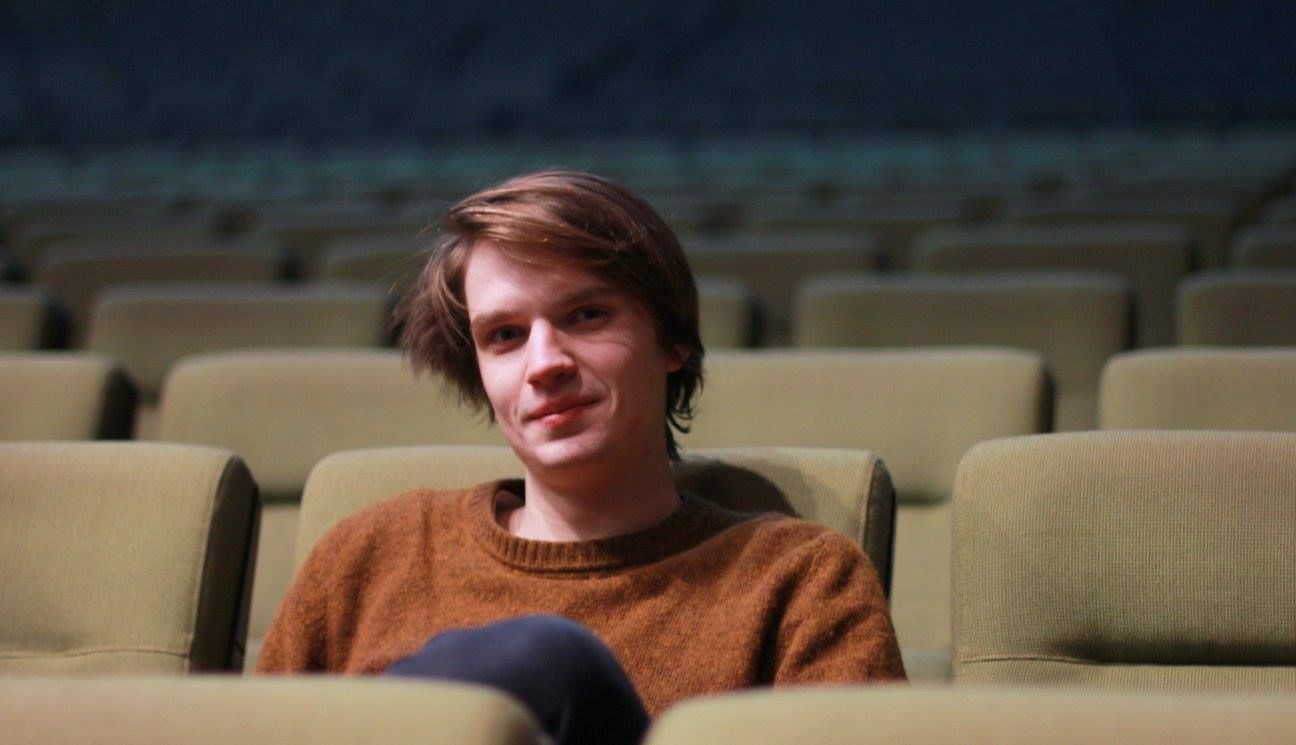
Paweł Malinowski studiował w klasie kompozycji prof. Wojciecha Widłaka, a także teorii muzyki pod kierunkiem dr hab. Agnieszki Draus w Akademii Muzycznej w Krakowie. Ponadto studiował kompozycję pod kierunkiem Nielsa Rønsholdta i Simona Steena-Andersena w Królewskiej Akademii Muzycznej w Aarhus. Swoje umiejętności poszerzał także na warsztatach i lekcjach mistrzowskich m.in. z Richardem Ayresem, Bernhardem Langiem, Stefanem Prinsem, Kaiją Saariaho, Marco Stroppą, czy Jennifer Walshe. Dyplomowy utwór Dziś wydaje mi się, że jest lepiej zdobył spore uznanie krytyki trafiając m.in. na listę 10 najważniejszych kompozytorskich premier 2017 roku według bloga niby-tygodnik.
https://soundcloud.com/pl-pawel-malinowski
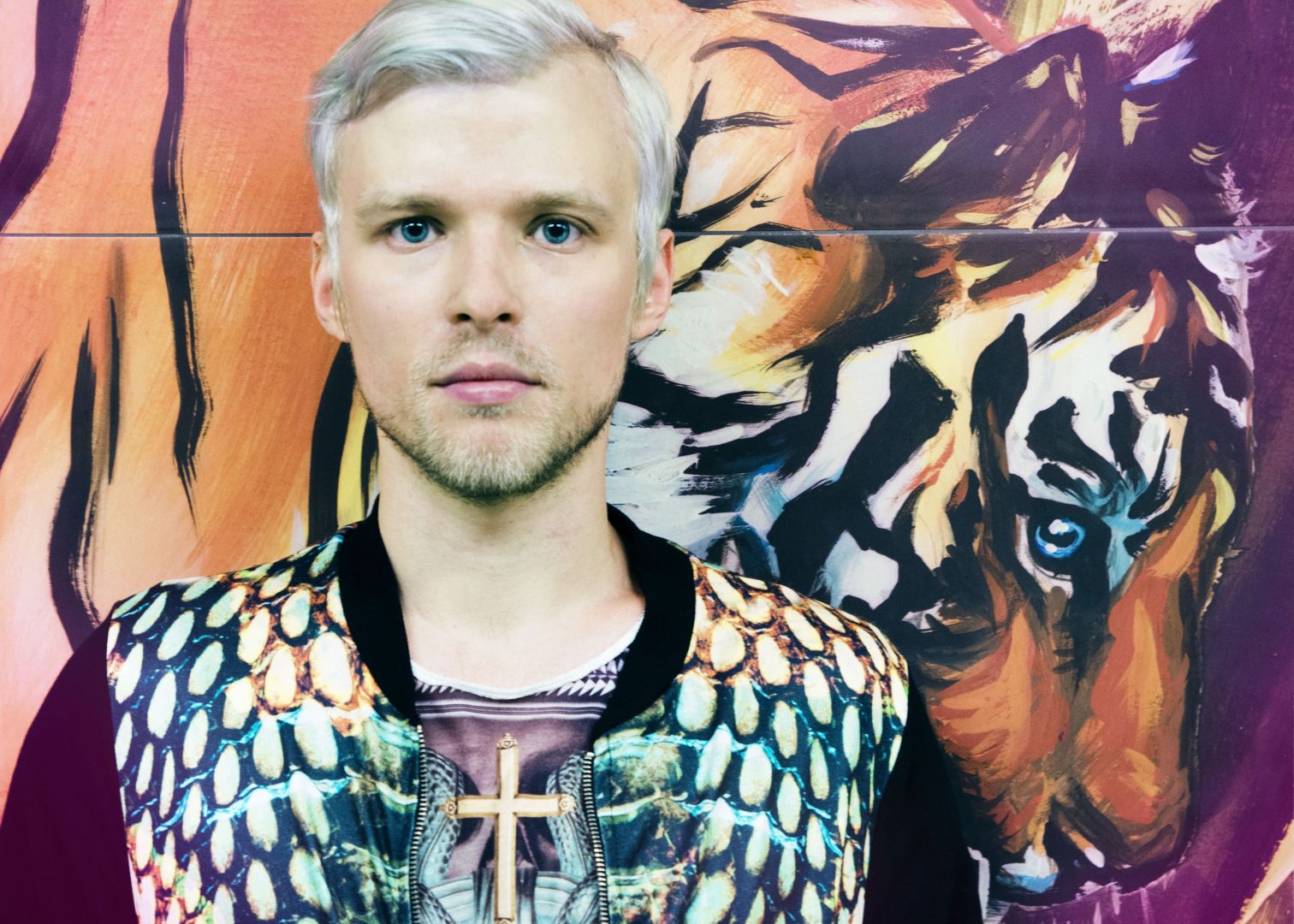
Mikołaj Laskowski ukończył z wyróżnieniem Królewskie Konserwatorium w Hadze, w
którym studiował pod kierunkiem Yannisa Kyriakides i Petera Adriaansza w latach
2013-2015. W latach 2009-2014 studiował w Akademii Muzycznej we Wrocławiu w
klasie Grażyny Pstrokońskiej-Nawratil. Jego utwory były wykonywane w Polsce,
Niemczech, Austrii, Francji, we Włoszech, Finlandii, Danii, Islandii, Holandii,
Rosji, Czechach, Stanach, m.in. na festiwalach Darmstadt International Summer
Course for New Music, Festival Presences, Gaudeamus Muziekweek, Klang Festival,
Musica Polonica Nova, Musica Electronica Nova, Nordic Music Days, Ostrava Days,
Tampere Biennale, Unsafe+Sounds
Festival, Warszawska Jesień, Young Composers Meeting.
Zdobył nagrody w takich konkursach kompozytorskich jak Generace 2012 czy Young Composers Meeting 2013. W 2014 roku otrzymał Stypendium im. Witolda Lutosławskiego, a w 2015 roku uzyskał rekomendację na 62. Międzynarodowej Trybunie Kompozytorów. W tym samym roku był laureatrem prestiżowej rezydencji w berlińskim zespole Ensemble Adapter W 2016 roku został nagrodzony Kranichsteiner Stipendienpreis na 48. Internationale Ferienkurse für Neue Musik w Darmstadt. Poza działalnością kompozytorską, gra na magnetofonach w duecie sultan hagavik.
https://soundcloud.com/mikolajlaskowski
Kanał kompozytora na YouTube
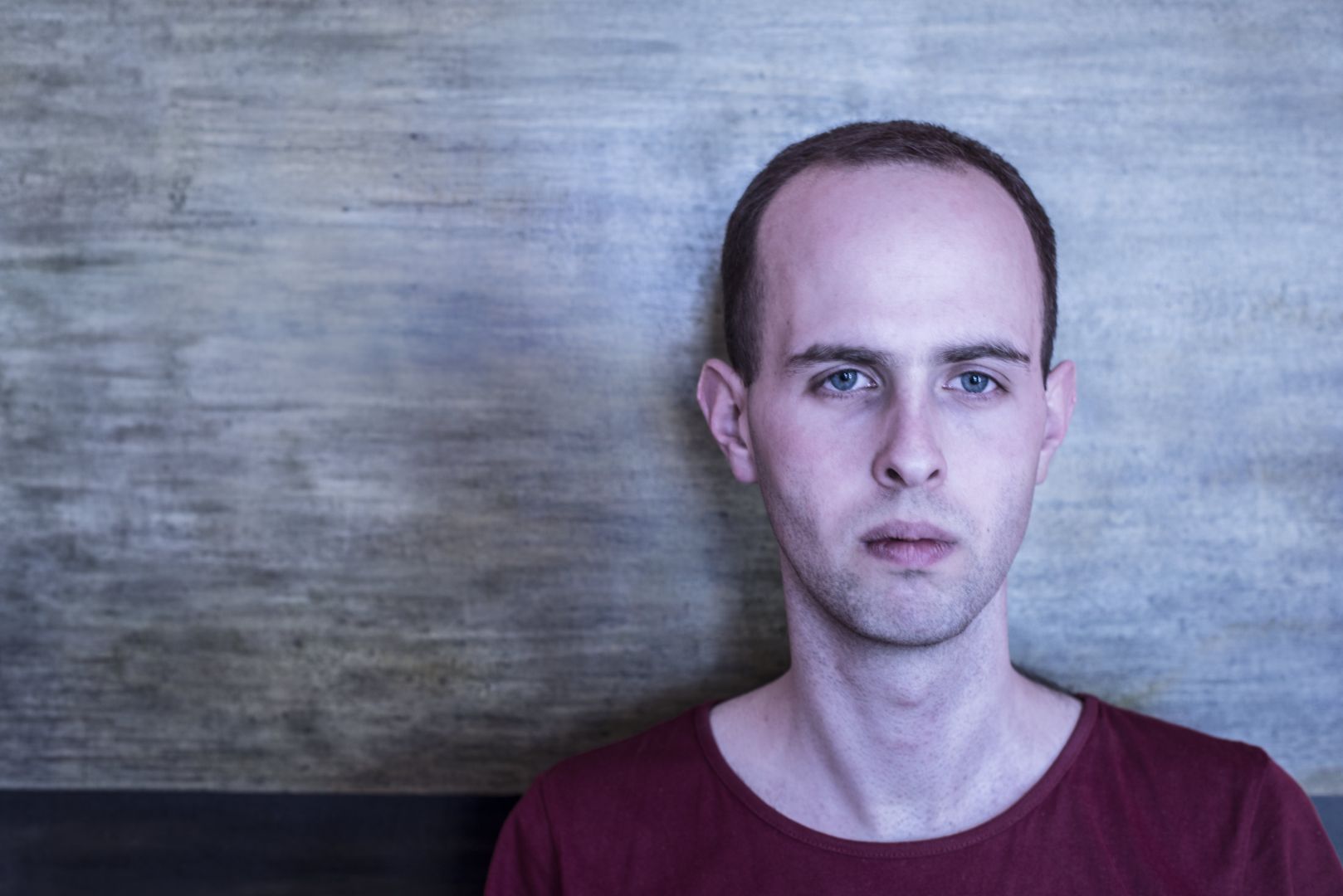
Piotr Peszat studiował kompozycję w Akademii Muzycznej w Krakowie w klasie Krzysztofa Meyera oraz w The Royal Academy of Music w Aarhus - Simona Steena-Andersena i Nielsa Rønsholdta. Po ukończeniu studiów doktoranckich pod kierunkiem Marka Chołoniewskiego w roku 2018 otrzymał tytuł doktora sztuki. Jest kompozytorem i artystą dźwiękowym działający w Krakowie. Jednym z jego najistotniejszych osiągnięć artystycznych jest wygrana w międzynarodowym konkursie Roche Young Commissions. w którym członkowie Jury — między innymi Pierre Boulez — zamówili u niego utwór na orkiestrę symfoniczną, który został wykonany podczas 77. Festiwalu w Lucernie w 2015 roku.
Jest laureatem m.in. pierwszej nagrody w konkursie MCI Meetings Composition Competition w Kopenhadze, drugiej nagrody ex aequo w 4. Konkursie Kompozytorskim im. Krzysztofa Pendereckiego w Sopocie. Ponadto, wygrał konkursy organizowane przez Ensemble MusikFabrik we współpracy z IAM, Ensemble Adapter oraz Ung Nordisk MusikFestival Danmark. Jego utwory były prezentowane podczas wielu koncertów i festiwali: MCI Summer Campus, Lucerne Festival, Ung Nordisk Musik Festival, Musica Electronica Nova, Darmstadt Ferienkurse Für Neue Musik, Donaueschinger Musiktage, Malta Festiwal, Sacrum Profanum Festiwal Audio Art, Ultraschall Festival.
https://soundcloud.com/piotr-peszat
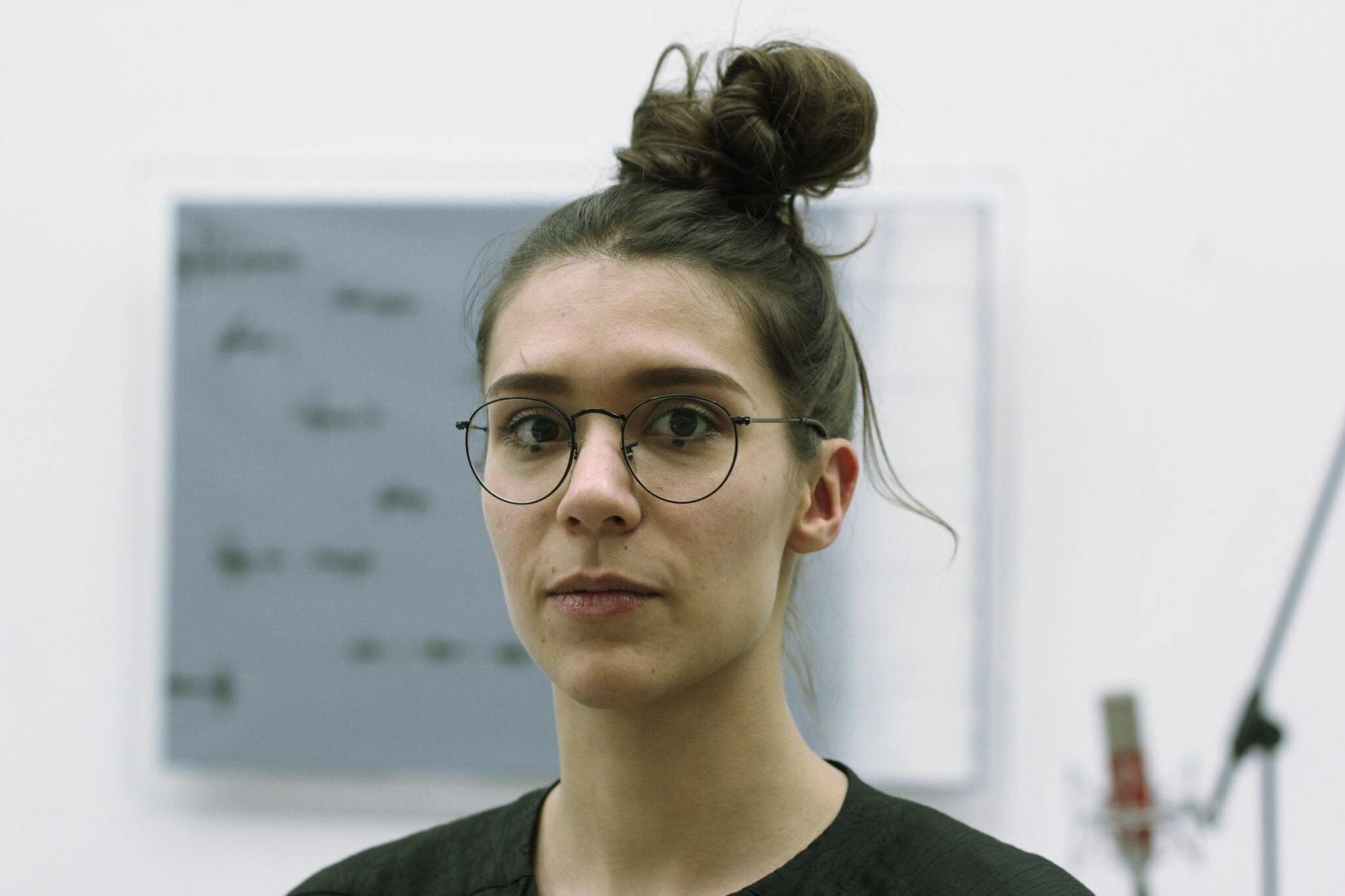
Teoniki Rożynek studiowała muzykologię na Uniwersytecie Jagiellońskim oraz kompozycję w klasie Krzysztofa Baculewskiego na Uniwersytecie Muzycznym Fryderyka Chopina w Warszawie. Inspiracje dla swojej muzyki kompozytorka czerpie głównie z otaczającego ją świata. Stąd fascynacja brzmieniem „brudnym”, glitchowym (ang. glitch – usterka), często „pozamuzycznym” – pochodzącym z maszyn i ich silników, odgłosów miast oraz natury.
Zainteresowania muzyczne Rożynek to w dużym stopniu barwa dźwięku, stąd poszukiwania i stosowanie rozszerzonych technik wykonawczych, próby generowania brzmień syntetycznych, nienaturalnych dla instrumentów muzycznych, a także włączanie w muzykę mediów elektronicznych i cyfrowych. Artystka brała udział w kursach (np. podczas Donaueschingen Musiktage) i konkursach kompozytorskich. Jej utwory były wykonywane m.in. podczas festiwalu Warszawska Jesień czy Musica Electronica Nova. Kompozytorka chętnie współpracuje z artystami działającymi na polu innych dziedzin sztuki. Współpracowała przy performansach, produkcjach filmowych i spektaklach teatralnych. Jej muzykę można usłyszeć m.in. w nagrodzonym Złotym Lwem na festiwalu w Gdyni filmie Wieża. Jasny dzień Jagody Szelc.
https://soundcloud.com/teonikirozynek

Marta Śniady jest kompozytorką związana z Łodzią i Wrocławiem. Ukończyła z wyróżnieniem kompozycję w klasie prof. Bronisława Kazimierza Przybylskiego w Akademii Muzycznej im. G. i K. Bacewiczów w Łodzi. Przez dwa lata kształciła się w ramach Podyplomowych Studiów Muzyki Filmowej, Komputerowej i Twórczości Audiowizualnej w Łodzi. Studiowała także w The Royal Academy of Music w Aarhus w klasie Simona Steen-Andersena i Nielsa Rønsholdta. Brała udział w licznych kursach kompozytorskich, m.in. 48. Międzynarodowych Kursach Muzyki Nowej Darmstadt 2016 oraz czterokrotnie w Międzynarodowych Letnich Kursach Kompozytorskich w Radziejowicach, podczas których kształciła się pod kierunkiem takich kompozytorów jak: Simon Steen-Andersen, Chaya Czernowin, Mark Andre, Rebecca Saunders, Johannes Kreidler i Philippe Manoury. W 2015 roku obroniła doktorat w zakresie kompozycji w Akademii Muzycznej w Łodzi i pracuje na tej uczelni na stanowisku adiunkta. Od 2017 roku jest członkiem rady programowej festiwalu Warszawska Jesień.
Jej utwory były prezentowane w Polsce, Francji, Niemczech i Danii podczas takich festiwali jak np. Warszawska Jesień, Musica Electronica Nova, Frau Musica (Nova), Musica Moderna, Umami Live, Musica Privata, Pulsar, Klang. O jej prestiżu, jako kompozytorki, świadczy współpraca z następującymi renomowanymi zespołami życia muzycznego: Kwartludium, EllettroVoce, Spółdzielnia Muzyczna, Orkiestra Muzyki Nowej, Ensemble Garage, Faces Ensemble oraz Duo van Vliet. Jest autorką muzyki instrumentalnej, scenicznej, elektroakustycznej; zajmuje się także muzyką audio-video.
https://martasniady.wordpress.com/
https://soundcloud.com/martasniady
NA CO ZBIERAMY?
Projekt miał być realizowany ze środków festiwalu Musica Polonica Nova oraz z dotacji z programu „Zamówienia kompozytorskie” Ministerstwa Kultury i Dziedzictwa Narodowego. Niestety, w związku ze skreśleniem koncertu z programu festiwalu, wniosek o dofinansowanie został wycofany i przekreślona została również szansa na ministerialną dotację. Koszty organizacji koncertu to nie tylko honoraria artystów, lecz także, a nawet przede wszystkim, koszty produkcji – wynajem sali, sprzętu do projekcji audio i wideo, instrumentów, koszty zakwaterowania i transportu. Wsparcie ze strony Przeglądu Sztuki SURVIVAL mogłoby pokryć tylko część tych kosztów, nie mówiąc o zapewnieniu artystom godziwych honorariów za ich wielotygodniową pracę. W tej sytuacji zwracamy się z prośbą o wsparcie bezpośrednio do naszych sympatyków i słuchaczy. Udowodnijmy razem, że rozwój sztuki współczesnej nie musi odbywać się tylko za sprawą państwowych dotacji!
PATRONAT MEDIALNY


ABOUT THE PROJECT
$półdzielnia
is a project formed by the Kraków-based contemporary music ensemble
Spółdzielnia Muzyczna along with a group of five composers of the younger
generation: Mikołaj Laskowski, Paweł Malinowski, Piotr Peszat, Teoniki Rożynek and
Marta Śniady. The enterprise was originated and is curated by music critic
Krzysztof Stefański. Pieces composed specifically for the project deal with the
role of money in the art world as well as that of art in a world ruled by
money, perhaps challenging the belief that the two realms in question are
mutually exclusive. The project’s premiere had been scheduled for the Musica
Polonica Nova festival in Wrocław; in the end, however, the concert was dropped
from the programme—for financial reasons, ironically enough. Despite the
institutional support being cut off, the young composers and performers
involved decided they’d stage the project anyway.
The cancelling
of a concert, although unpleasant, is unfortunately nothing new to us. As young
artists occupied with contemporary music, we contend with low fees,
unfavourable contracts, difficult working conditions, lack of institutional
support, or whims on the part of cultural institutions and festivals—week in,
week out. We regret that state financing is hardly balanced—at least in
Poland—by private patronage; that there is no private sector of composing
commissions in place, operating in the way the private art market does. At the
same time, money remains a taboo in the art world—it is widely known, after
all, that artistic activity is just one’s heart’s desire, pursued in creative
rapture and fuelled by thin air…—hampering the dispute that would bring about
improvements in this respect. The project $półdzielnia is meant to defy that
tabooing attitude by openly commenting on the relationships between art and
money. Building upon their own experience in contemporary music circles, the
composers can also be expected to reflect more broadly on capitalism,
commercialisation, or consumerism.
The piece try to watch this without crying by Piotr Peszat draws on the phenomenon of super-gallery—the sanctuary of the present, as well as of consumption and commerce. In the composition Taśmociąg [Conveyor belt] by Teoniki Rożynek, the watchphrase, so to say, goes “faster—cheaper—more precisely”. Mikołaj Laskowski, in Fire up/Zapal się, makes use of footage from motivational meetings held in several organisations modelled like pyramid schemes, which colonised Poland’s immature capitalist economy of the early 1990s. They can’t see you like I can by Paweł Malinowski, employing simple props and video projection, unfolds the interior of a typical flat owned by the contemporary consumerist. Last but not least, Probably the most beautiful music in the world by Marta Śniady makes a reference to the aesthetic aspects of advertising; the composer is working on a piece designed to please you—because you’re worth it. Breaks in between the compositions leave time for advertising blocks—these will simulate the user experience of free streaming platforms, where ads brutally interrupt even the most solemn music. And to wrap up the concert, a bit of curatorial commentary, outlining the financial side of the enterprise with raw numbers: sources of income and respective amounts, costs incurred, and fees awarded (per man-hour).
ABOUT US
The artists invited to take part in the project, although young, are already recognised internationally.
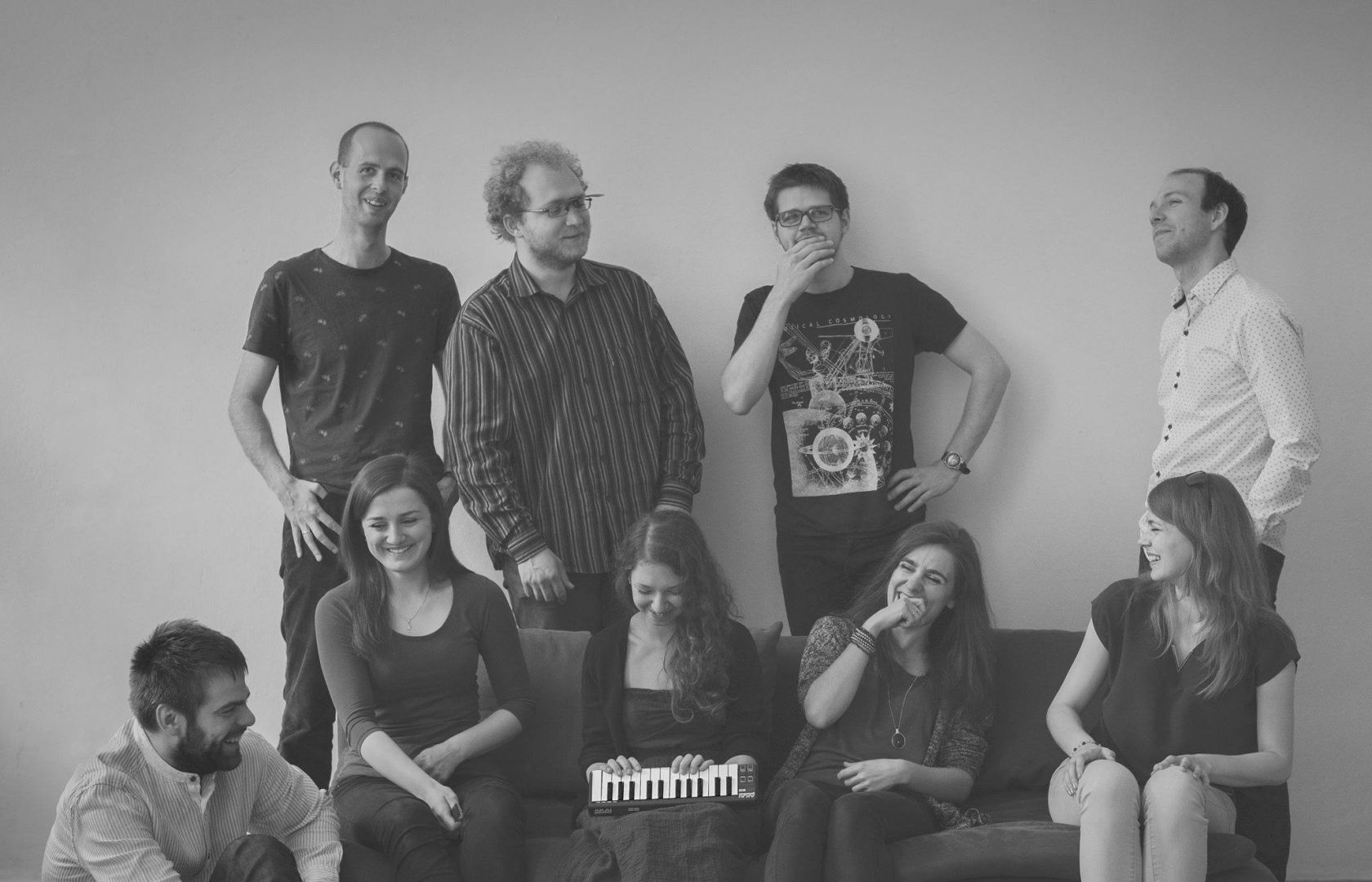
The Spółdzielnia Muzyczna [Musicians Associated] Contemporary Ensemble formed in 2014, when a group of Kraków-based instrumentalists, who had performed together with the European Workshop for Contemporary Music, attended the programme for young ensembles at Darmstadt’s International Summer Course for New Music. So an idea was born to maintain the already fruitful collaboration in the shape of a regular ensemble. Since, our common ground has been the desire to explore contemporary music in all its manifestations and genres, from various periods and diverse musical cultures—for the purpose of performing such pieces, and in such a way, that would foster understanding, interest and passion both in us and in our audiences.
Over just a few years’ time, the ensemble has performed at Poland’s most important contemporary music festivals—Musicians Associated have already been invited to such events as Warsaw Autumn, Sacrum Profanum, Audio Art, Musica Moderna, and aXes – the New Music Triduum. At the 59th Warsaw Autumn (2016), we contributed to the Polish premiere of Salvatore Sciarrino’s operatic work Luci mie traditrici, in its staged rendering, co-produced by the Warsaw Chamber Opera. As part of the Sacrum Profanum festival, the ensemble has been engaged in projects involving classically trained musicians on a par with independent/alternative music artists including, among others, Bedroom Community, Aidan Baker, Paweł Kulczyński and Toby Driver. Apart from concert activity, Musicians Associated also follow educational pursuits—that is, the Otwórz uszy [Open Your Ears] series, aimed at introducing the leading figures of 20th- and 21st-century composed music to wider audiences.
facebook.com/spoldzielniamuzyczna
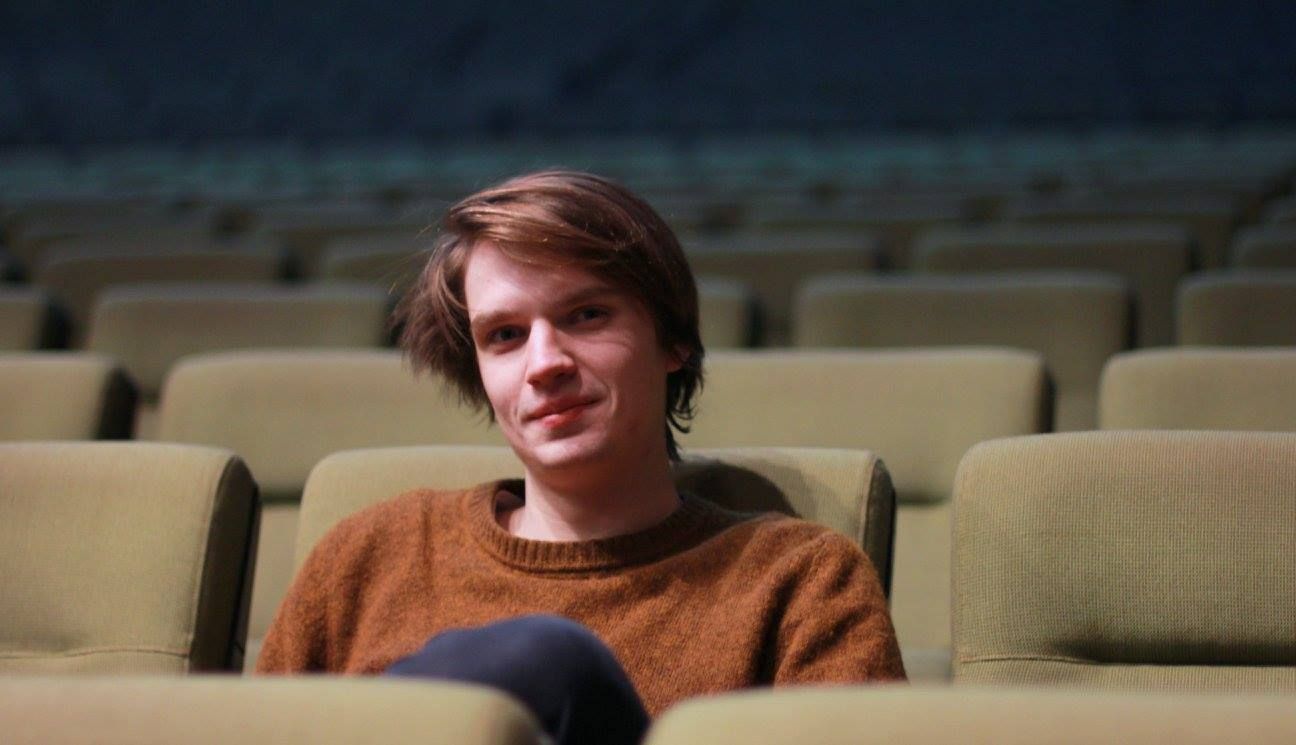
Paweł Malinowski graduated from the composition class led by Prof. Wojciech Widłak at the Academy of Music in Kraków; he also studied music theory there, with Agnieszka Draus, PhD, as well as composition with Niels Rønsholdt and Simon Steen-Andersen at the Royal Academy of Music in Aarhus. He further developed his skills during workshops and masterclasses with, among others, Richard Ayres, Bernhard Lang, Stefan Prins, Kaija Saariaho, Marco Stroppa and Jennifer Walshe. His graduation piece Dziś wydaje mi się, że jest lepiej [It seems to me that today’s better] was greeted with widespread acclaim, being included, for instance, among the top ten composer premieres of 2017 according to the “niby-tygodnik” blog.
His works have been performed at such events as Musica Electronica Nova, Örebro Contemporary Music Festival, Elementi conference, Ostrava New Music Days and Warsaw Autumn. In 2016, while still a student, he won the first prize at the 58th Tadeusz Baird Competition for Young Composers. His output also includes theoretical texts, published in the “MEAKULTURA” magazine, on camp and on the oeuvre of Michael Beil.
https://soundcloud.com/pl-pawel-malinowski

Mikołaj Laskowski graduated with distinction from the Royal Conservatory of The Hague, where in 2013–2015 he studied with Yannis Kyriakides and Peter Adriaansz; in 2009–2014 he studied at the Karol Lipiński Academy of Music in Wrocław, in the class led by Grażyna Pstrokońska-Nawratil. His works have been performed in Poland, Germany, Austria, France, Italy, Finland, Denmark, Iceland, Russia, in the Netherlands, in Czech Republic and in the United States—at such events as Internationale Ferienkurse für Neue Musik in Darmstadt, Festival Présences, Gaudeamus Muziekweek, KLANG Festival, Musica Polonica Nova and Musica Electronica Nova festivals, Nordic Music Days, Ostrava Days, Tampere Biennale, Unsafe+Sounds Festival, Warsaw Autumn and Young Composers Meeting.
He was recognised with awards in such composer competitions as Generace (2012) and Young Composers Meeting (2013). In 2014 he was awarded the Witold Lutosławski Scholarship, and in 2015 he earned a recommendation from the 62nd International Rostrum of Composers; that same year he won the prestigious residency with Berlin-based Ensemble Adapter. In 2016 he was selected for the Kranichsteiner Stipendienpreis at the 48th International Summer Course for New Music in Darmstadt. Apart from composing, he plays tape recorders in the duo sultan hagavik.
https://soundcloud.com/mikolajlaskowski
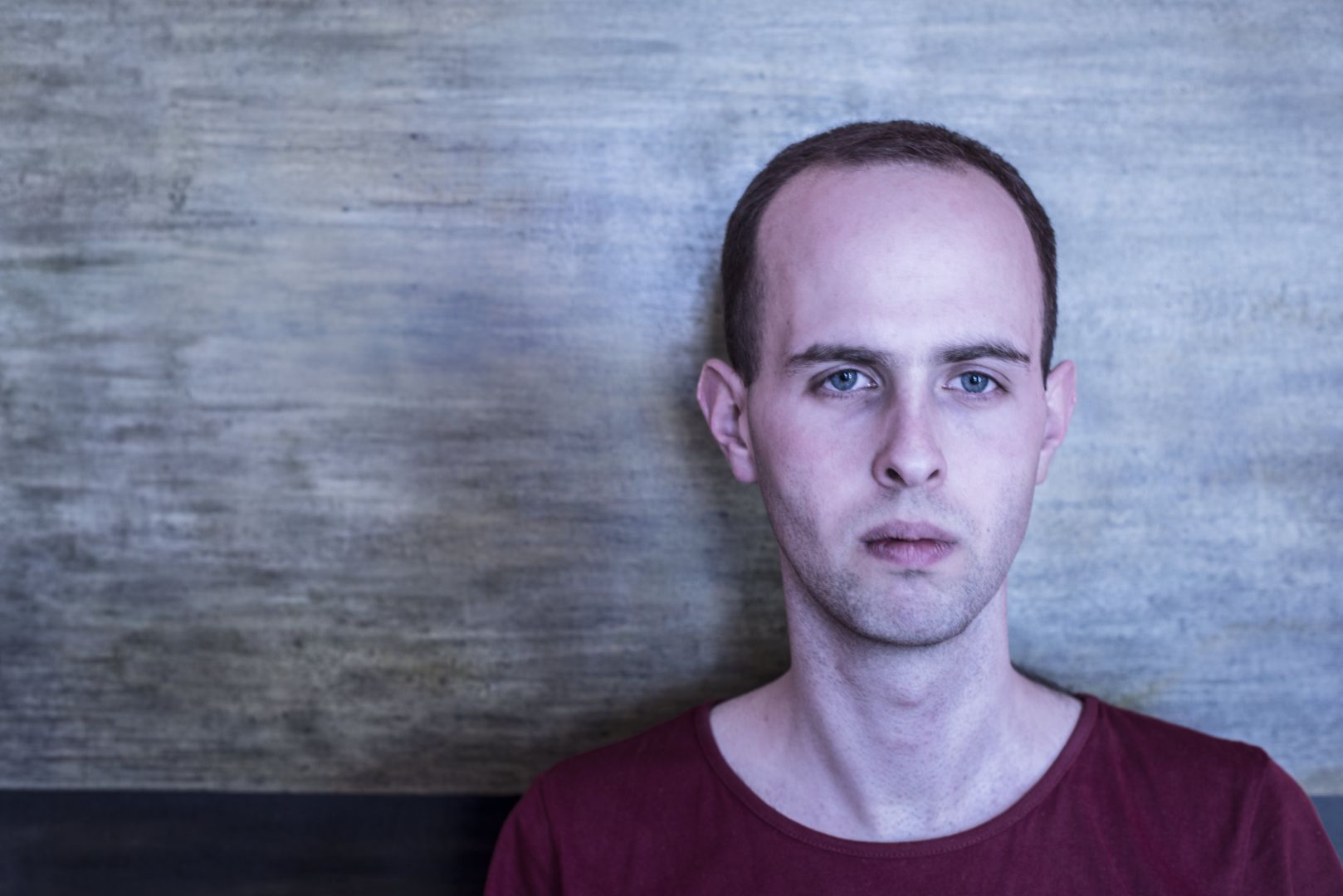
Piotr Peszat graduated from the composition class led by Krzysztof Meyer at the Academy of Music in Kraków, and also from the Royal Academy of Music in Aarhus, where he studied composition with Simon Steen-Andersen and Niels Rønsholdt. Having completed his doctoral studies under Marek Chołoniewski, in 2018 he received a DMA degree. As composer and sound artist he is mostly active in Kraków. One of his most significant artistic achievements is first prize in the international competition Roche Young Commissions, which earned him a commission from the Jury—among them Pierre Boulez—to write a piece for orchestra, subsequently performed at the 77th Lucerne Festival (2015).
He is the laureate of, among other awards, first prize in the 2014 MCI Meetings Composition Competition in Copenhagen and second prize (ex aequo) in the 4th Krzysztof Penderecki Composers Competition in Sopot; he has also won competitions held by Ensemble Musikfabrik in cooperation with IAM, Ensemble Adapter and Ung Nordisk MusikFestival Danmark. His works have been performed in many concerts and at many festivals, including the MCI Summer Campus, Lucerne Festival, Ung Nordisk Musik Festival, Musica Electronica Nova, Internationale Ferienkurse für Neue Musik in Darmstadt, Donaueschinger Musiktage, Malta Festival, Sacrum Profanum, Audio Art and Ultraschall Festival.
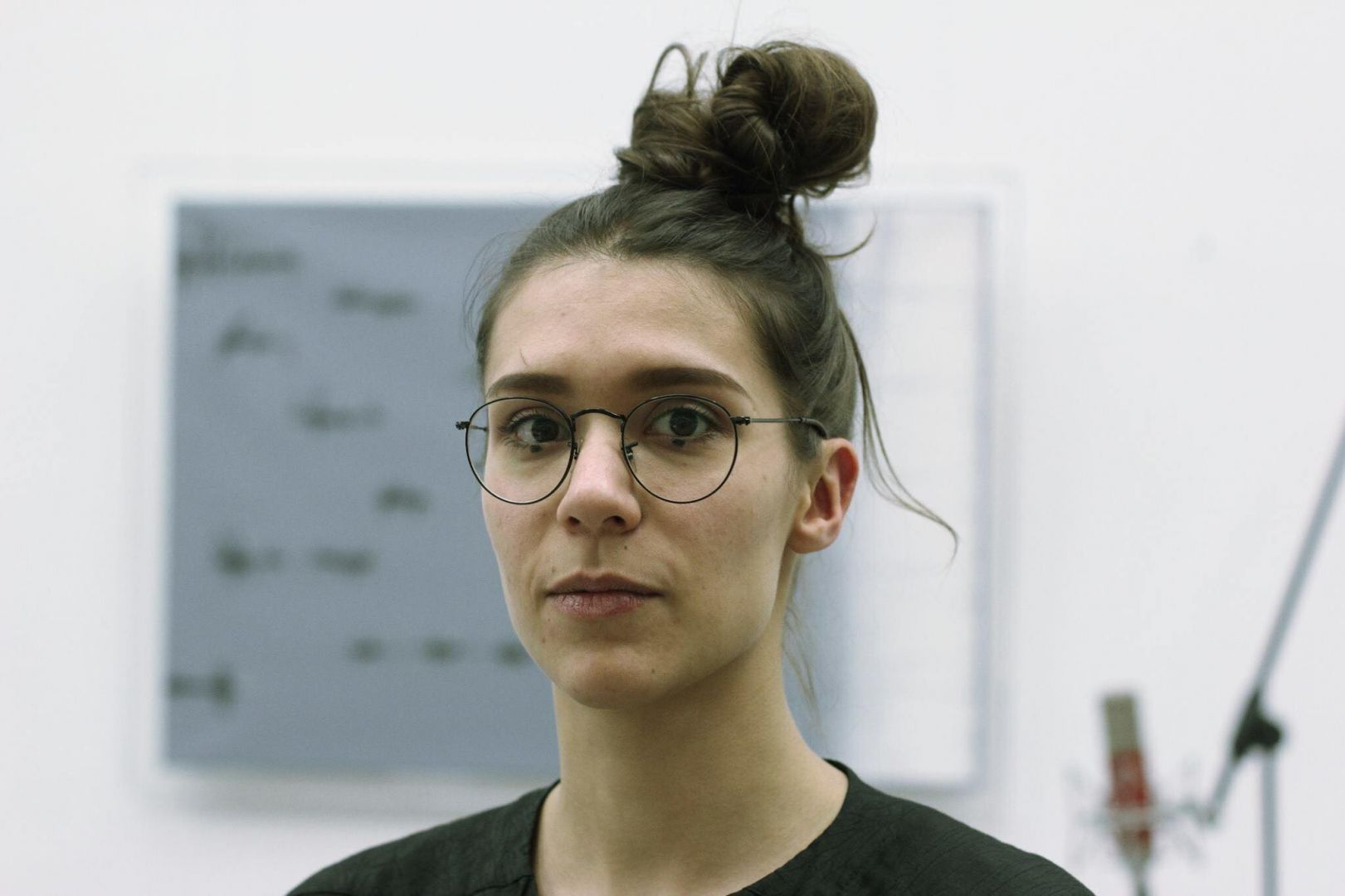
Teoniki Rożynek studied musicology at the Jagiellonian University and composition, in the class led by Krzysztof Baculewski, at the Fryderyk Chopin University of Music in Warsaw. She draws inspirations for her music mostly from the environment; hence the composer’s fascination with “dirty”, glitch-like sound, often “non-musical”, originating from engines and machines, from urban as well as natural soundscapes.
As far as musical matter is concerned, Rożynek is most interested in tone and timbre; hence her quest for and use of extended techniques, attempts at achieving a synthetic sound which is foreign to classical instruments, and incorporation of digital and electronic media into musical works. The artist has taken part in composition courses, those at Donaueschinger Musiktage among others, and composer competitions. Her works have been performed at Warsaw Autumn as well as at the Musica Electronica Nova festival. The composer is keen to work together with artists representing different creative domains. She has contributed to performance acts as well as film and stage productions; among other features, her music accompanies the film Showtimes for Tower. A Bright Day by Jagoda Szelc, awarded at the Gdynia Film Festival and at the International Festival of Independent Cinema NETIA OFF CAMERA in Kraków.

Marta Śniady is a composer in relationships with the cities of Łódź and Wrocław. She graduated with distinction from the composition class led by Prof. Bronisław Kazimierz Przybylski at the Academy of Music in Łódź, where she also broadened her education, attending the Post-Diploma Non-Degree Studies in the Field of Film Music, Computer Music and Audiovisual Work over the period of two years. She studied at the Royal Academy of Music in Aarhus too, in the class led by Simon Steen-Andersen and Niels Rønsholdt. She completed many courses in composition, including those at the 48th International Summer Courses for New Music in Darmstadt (2016) and, four times so, at the International Summer Course for Composers in Radziejowice, learning from such figures as Simon Steen-Andersen, Chaya Czernowin, Mark Andre, Rebecca Saunders, Johannes Kreidler and Philippe Manoury. In 2015 she defended her doctoral dissertation in composition at the Academy of Music in Łódź, and she’s currently teaching there as Assistant Professor. Since 2017 she has been member of Warsaw Autumn’s Repertoire Committee.
Her works have been presented in Poland, France, Germany and Denmark, at such festivals as Warsaw Autumn, Musica Electronica Nova, Frau musica (nova), Musica Moderna, umami live, Musica Privata, Pulsar and KLANG. Her prestige as composer is reflected in collaborations with the following, acclaimed groups: Kwartludium, ElettroVoce, Spółdzielnia Muzyczna, Orkiestra Muzyki Nowej, Ensemble Garage, Faces Ensemble, Duo van Vliet. Apart from writing instrumental, stage and electroacoustic music, she follows audio-visual pursuits.
FUNDRAISING GOAL
The project was supposed to be financed with funds from the Musica Polonica Nova festival, backed by the “Composing Commissions” grant from Poland’s Ministry of Culture and National Heritage. Regrettably, as the concert was dropped from the festival schedule, the governmental programme application was withdrawn, and the chance for ministerial financing lost. Let it be noted here that production costs of any concert do not come down to artists’ fees, as such budgets also—or in the first place—have to cover expenses like rental of venue, AV equipment and instruments as well as contributors’ travel and accommodation. Support from the SURVIVAL Art Review could only account for a fraction of these outlays, even as calculated excluding a least decent remuneration for the artists’ weeks-long work. Having found ourselves in these adverse circumstances, we address our plea directly to you, supporters and listeners: may we demonstrate together that contemporary art is able to grow without financial assistance of the state!
MEDIA PATRONAGE


IF YOU WISH TO SUPPORT OUR PROJECT:
1. Visit the fundraising page: https://odpalprojekt.pl/projekty/finansujacy/2236,uratuj-poldzielnie (available in Polish only; straightforward instructions follow).
2. Click “WEPSRZYJ” [DONATE] on the right, above the collection completion details.
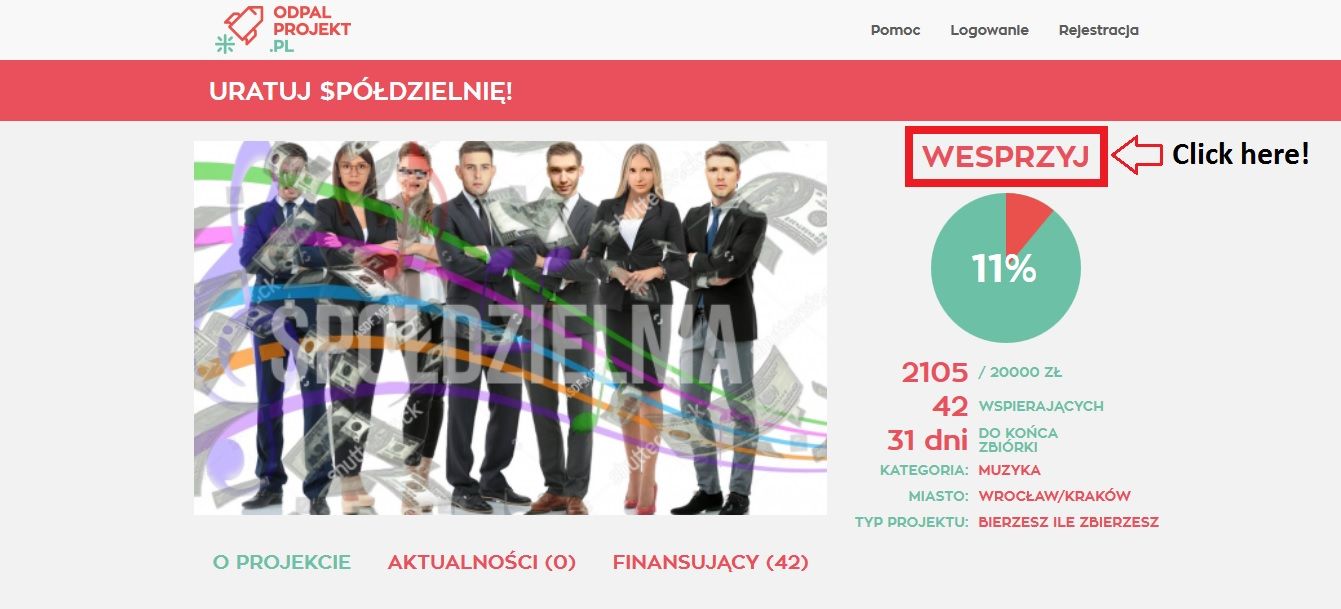
3. Choose your amount:
- 5 zł (ca 1.25 EUR) is going to put a smile on our faces.
- 10 zł (ca 2.5 EUR) gives you a single ticket to the concert, which is going to take place in a small-capacity venue.
- 20 zł (ca 5 EUR) grants you an early entrance invitation to the concert.
- 50 zł (ca 12.5 EUR) makes the invitation special, covering a press package and a thank-you mention in social media.
- 100 zł (ca 25 EUR) further enhances the invitation’s uniqueness, making it include a specially designed gadget and a written thank-you note.
- 200 zł (ca 50 EUR) allows you to air an advertisement in one of the commercial breaks during the concert. 200 PLN gives you 20 seconds, and extended duration will cost you 20 PLN for each second past the 20th. Our sponsors are also going to be addressed from the stage.
- 1000 zł (ca 250 EUR) makes you a “golden sponsor”, so entitling you, beyond the scope of the basic sponsorship described above, to display banners and/or roll-ups within the concert venue. A double super-special invitation (see the 100 zł option) to the concert of your choice is included.
- 5000 zł (ca 1250 EUR) makes you the naming rights sponsor of a commissioned piece. The composition bearing the name of your company may also include a product or a service of your choice, as product placement. You will also receive a signed copy of the score, and a double super-special invitation to the selected concert. The sum will go, in its entirety, to the composer chosen by the sponsor.
- 10000 zł (ca 2500 EUR) makes you the main sponsor of a concert. The event will bear the name of your company, and will appear as such in all the promotion channels involved. The sponsor’s advertisements will air during the commercial breaks, his or her promotional material will be included in the press package, and his or her banners and/or roll-ups will be displayed within the venue. Three double super-special invitations to any of the concerts are included.
- 50000 zł (ca 125000 EUR) makes you the naming rights sponsor of the project and enables us to arrange an additional concert or partly cover the cost of presenting the outcome at several festivals. The name of your brand will become part of the project title, and you will be granted rights to advertisement as well as three double invitations as above.
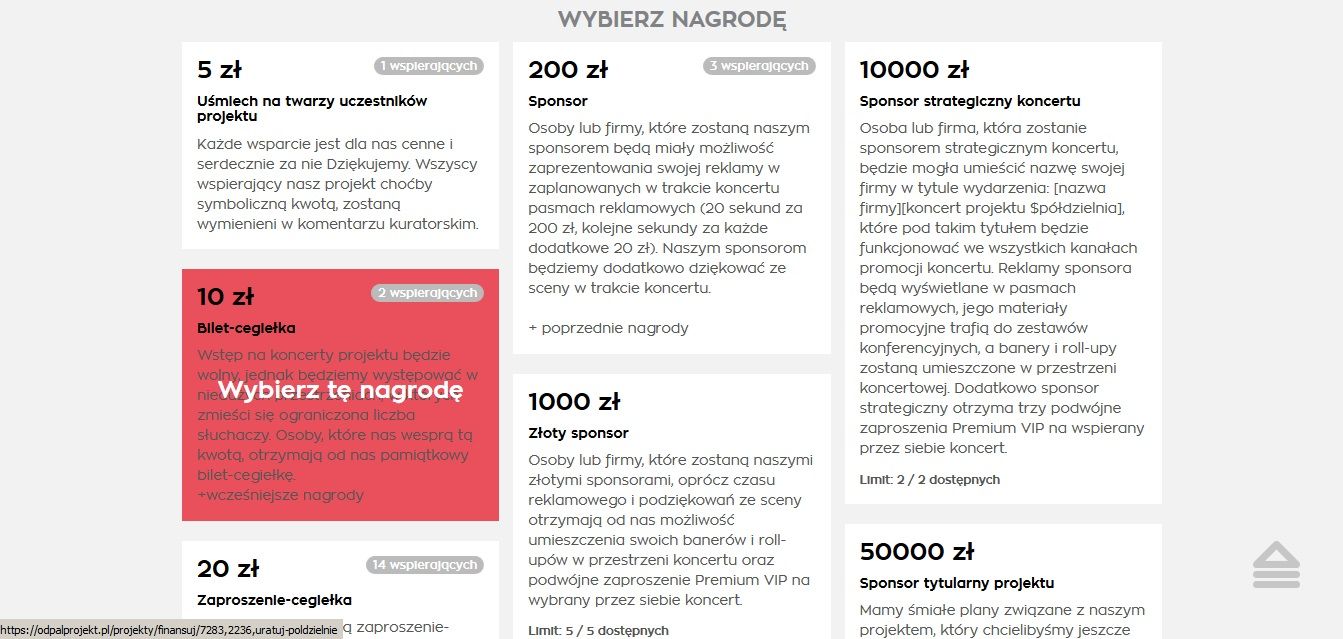
4. Log in. For convenience, do so through Google+ or Facebook. To proceed, accept the terms and conditions by ticking the first checkbox (the one marked with an asterisk) and clicking “Zarejestruj” [Register] directly below that checkbox.
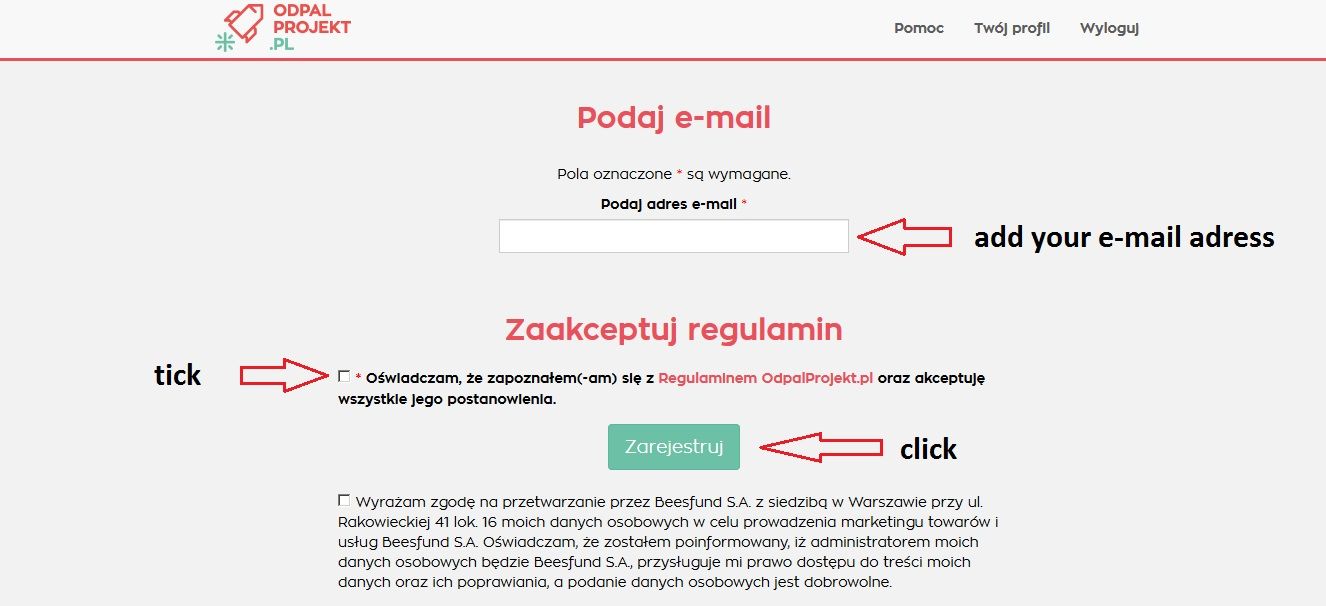
5. Fill in the form, or at least the mandatory fields therein, marked with asterisks:
- “Nazwa użytkownika” is the odpalprojekt.pl username of your choice.
- “Imię” is your first name.
- “Nazwisko” is your last name.
- “Ulica” and “Numer domu/mieszkania”, respectively, constitute your street address: name the street in the first field and provide the building and door numbers in the other.
- “Miasto” is your town or city of residence.
- “Kod pocztowy” is your postal code.
- “Kraj” is your country of residence.
- Make sure you tick the first, mandatory checkbox below the input fields, so as to confirm you accept the terms and conditions.
- Tick the second checkbox if this is not the first time you’re about to support an undertaking through the odpalprojekt.pl platform and at the same instant you wish to update your personal data with those provided now.
- Click the button labelled “Przejdź do płatności” [Proceed to payment].
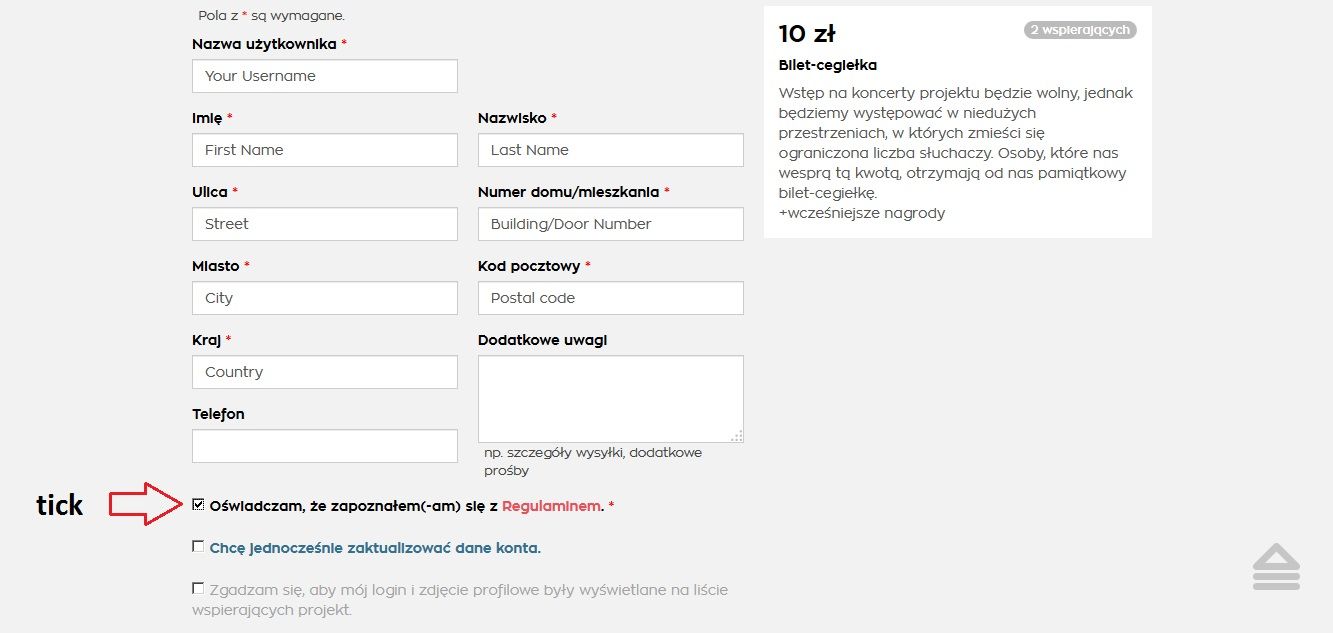
6. Choose your preferred payment method. The tpay.com option allows you to make a SEPA_Transfer. Upon choosing tpay.com, and consequently S€PA, fill in the form:
- “Imię i nazwisko/Nazwa” is either your first and last name or the name of your business.
- “E-mail” is self-explanatory.
- “Adres” is your street address.
- “Telefon kontaktowy” is your phone number.
- “Kod” is your postal code.
- “Miasto” is your town or city of residence, again.
- “Kraj” is your country of residence, again.
- Make sure to tick the first, mandatory checkbox below the input fields.
- Click the green button labelled “Następny krok” [Next step].
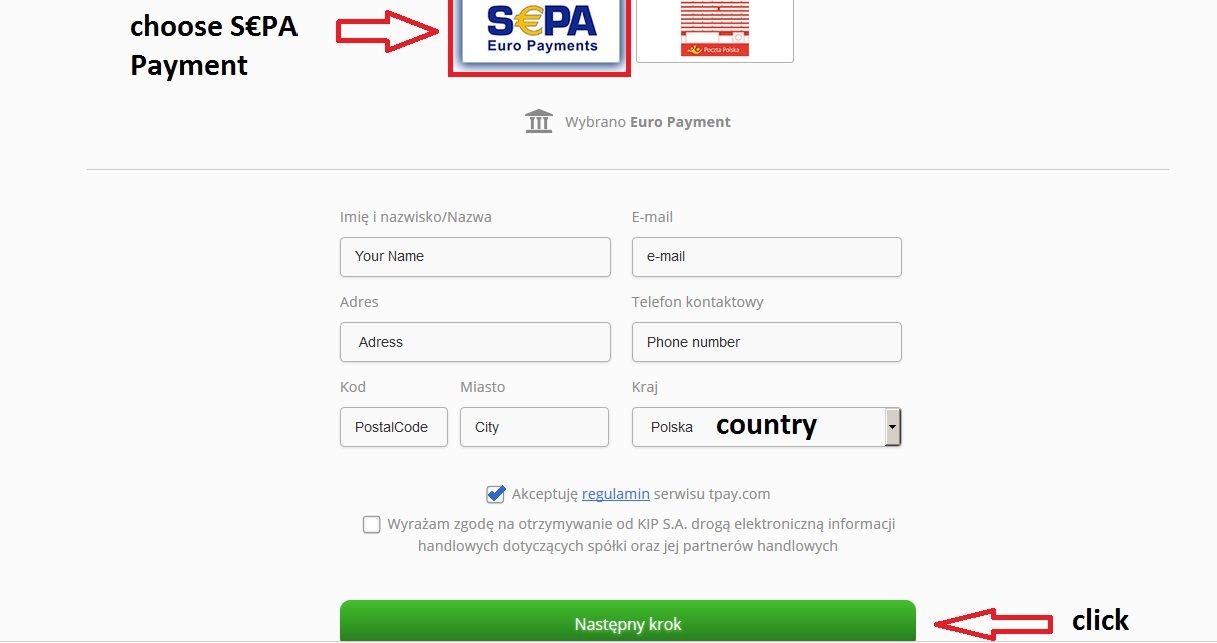
7. Follow the payment instructions (now given in English). Let us explain the data provided for your transfer, in case the labels are displayed in Polish:
- “Odbiorca” is the recipient’s name.
- “Adres odbiorcy” is the recipient’s address.
- “Kraj odbiorcy” is the recipient’s country.
- “Nazwa banku” is the name of the recipient’s bank.
- “Adres banku” is that bank’s address.
- “BIC/SWIFT” does not require translation.
- “IBAN numer rachunku” is the receiving account number.
- “Tytuł płatności” is the payment title/purpose. You only have to insert the generated code (like “TR-123-456789”, with the figures identifying your donation) in that field; do not input anything else there.
- “Kwota” is the donated amount.
- “Status wpłaty” is the status of your transaction. That field reads “oczekująca” as long as the payment is pending. To refresh, click “Sprawdź” [Request status].
Having followed these instructions, you’re all done—thank you for your kind support!
